- Introduction
- Importance of topic
- About research domain or topic
- Active research area
- Well studied issue or topic
- Considerable interest in community
- New or Emerging techniques
- Recent advancements
- Future expectations and predictions
- Rise to prominence
- Generally accepted findings and facts
- Importance of understanding
- Conventional approach
- Timeline
- Numbers
- Problem, Solution & Difficulties
- Problem definition
- Known problems or issues
- Problems cited in literature
- Solving a problem
- Possible solutions
- Current solutions
- Your solution
- Partial solution
- Unconventional approach or solution
- Problem review
- Complexity of the problem
- Efforts in the research community
- Research difficulties
- Difficulties and challenges
- Difficulty peforming an action
- Difficulty in making decision
- Limiting factors or issues
- Literature Review
- Intro to literature review
- Well studied topic in literature
- Many studies in literature
- Methods and solutions in literature
- Drawbacks of previous studies
- Review
- Surveys
- Recent literature
- Seminal or pioneering work
- Similar works in literature
- Comparative studies
- Derivative work
- Agreements and Disagreements in literature
- Debated or controversial issues
- Questionable studies
- Referencing literature
- Drawing inspiraton from literature
- Summary of previous literature
- More information on the topic
- Previous Evidence and Findings
- Research Gap
- Your Work
- Section Intro and Scope
- Materials and Methods
- About the method
- Method implementation
- Experimental setup
- Simple method
- Fast method
- Standard method
- Popular method
- Alternative methods
- Controversial method
- Comparing methods
- Lack of methods
- Combining methods
- Origins of the method
- Adapting or extending a method
- Uniqueness of your method
- Many methods available
- Advantages and features of methods
- Advantages and disadvantages of methods
- Drawback and limitations of methods
- Using previously published methods
- Previous usage of the method
- Pilot or preliminary studies
- Lack of validation
- Validation of the methods
- Testing and evaluation
- Measurements and Calculations
- Technical Statements
- Reason for choice
- Inappropriate choice
- Adequate for the experiment
- Inadequate for the experiment
- Conditions, constraints and criteria
- Assumptions and approximations
- No assumptions
- Incorrect assumptions
- Validity of assumption
- Starting point
- Initialization
- Simplification
- Prerequisites
- Requirements
- Neglected or ignored aspects
- Important aspects
- Taking things into account
- Careful consideration
- Drawing attention
- Prior knowledge
- Practical issues
- Improving accuracy or performance
- Making modifications or improvements
- Lack of information
- Steps and Stages
- Special cases
- Guidance and recommendations
- Notations
- Lessons from previous studies
- Raising concerns
- Data Collection and Processing
- Data Analysis & Presentation
- Statistics
- Errors and Discrepancies
- Results
- Results intro
- Analysis methods
- Analysis software
- General findings
- Positive findings
- Negative findings
- Neutral findings
- Key findings
- Interesting findings
- Expected findings
- Unexpected findings
- Inconclusive results
- Difficulty in analysis
- Additional analysis
- Comparing results with previous work
- Results in good aggreement with previous work
- Results in disaggreement with previous work
- Interpret with caution
- Discussion
- Reasons, Causes & Explanations
- Figures, Plots and Tables
- Explain or Describe
- General Statements
- Acknowledgements
- Others
Phrase Templates 
REF-N-WRITE is proud to announce the launch of the academic phrasebank. The phrasebank is now available as part of the Word AddIn. New buttons and options have been added to the AddIn for the users to access the academic phrasebank and search through academic phrases. A selection of academic phrases from the phrasebank has been made available above for demonstration purposes. The search results are limited to five academic phrases in the demo version.
1. Academic Phrasebank
Academic phrasebank refers to a library containing a collection of English phrases that can be readily used in scientific papers and academic reports. The REF-N-WRITE team has painstakingly created a phrasebank of 20,000 academic writing phrases for use by students and researchers writing research papers. These academic phrases were extracted from high-quality scientific journal articles by a team of academic experts. Only very small chunks of generic text were extracted from previous papers, and hence the use of these academic phrases in new papers will not constitute plagiarism. The academic phrases in the phrasebank are organized in the order in which you will be required to use in a scientific paper. The academic phrases can be accessed by simply clicking on each category.
The academic writing phrases are organized into following sections (1) Introduction; (2) Problem, Solution & Difficulties; (3) Literature Review; (4) Previous Evidence and Findings; (5) Research Gap; (6) Your Work; (7) Section Intro and Scope; (8) Materials and Methods; (9) Measurements and Calculations; (10) Technical Statements; (11) Data Collection and Processing; (12) Data Analysis & Presentation; (13) Statistics; (14) Errors and Discrepancies; (15) Results; (16) Discussion and (17) Acknowledgements. In addition to this, there are some general categories of academic phrases which include: (1) Reasons, Causes & Explanations; (2) Figures, Plots and Tables; (3) Explain or Describe; (4) General Statements and (5) Others.
The various categories available within the academic phrasebank is illustrated below in the following figure.
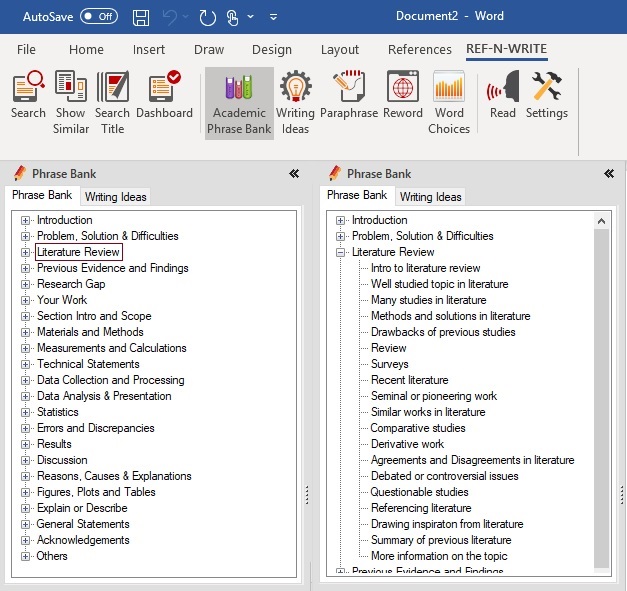
2. Getting Writing Ideas
You can search the academic phrasebank for writing themes and ideas by simply selecting a piece of text in MS Word and then clicking the ‘Writing Ideas’ button. The tool will perform an analysis on the selected text and bring up relevant categories from the academic phrasebank. Then the academic phrases belonging to the categories can be accessed by simply clicking on the category name. The screenshot below demonstrates how you can search for categories relevant to your writing in the academic phrasebank.
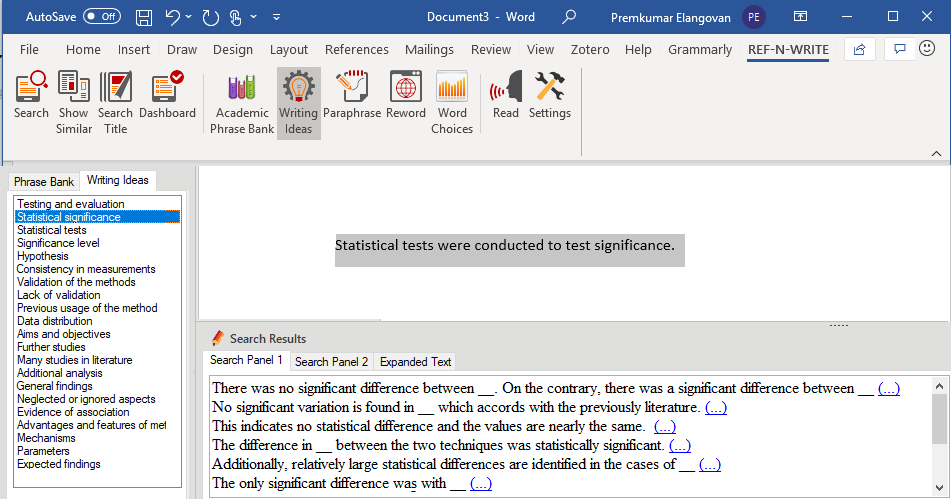
3. Getting Paraphrasing Ideas
REF-N-WRITE AddIn comes with a paraphrasing tool that allows users to search for rephrasing ideas from the academic phrasebank. The user has to select a sentence in MS Word document that they would like to rephrase or reword and click the ‘Paraphrasing Tool’ button in the REF-N-WRITE button panel. The tool will search through the academic phrases and bring up phrase templates relevant to the selected text. The user can use this collection of phrases to get paraphrasing ideas for the text. Furthermore, the user can bring up more similar phrases by clicking on the more button(…) that is shown next to each phrase template in the search results panel. The figure below illustrates how to get paraphrasing ideas from the academic phrasebank.
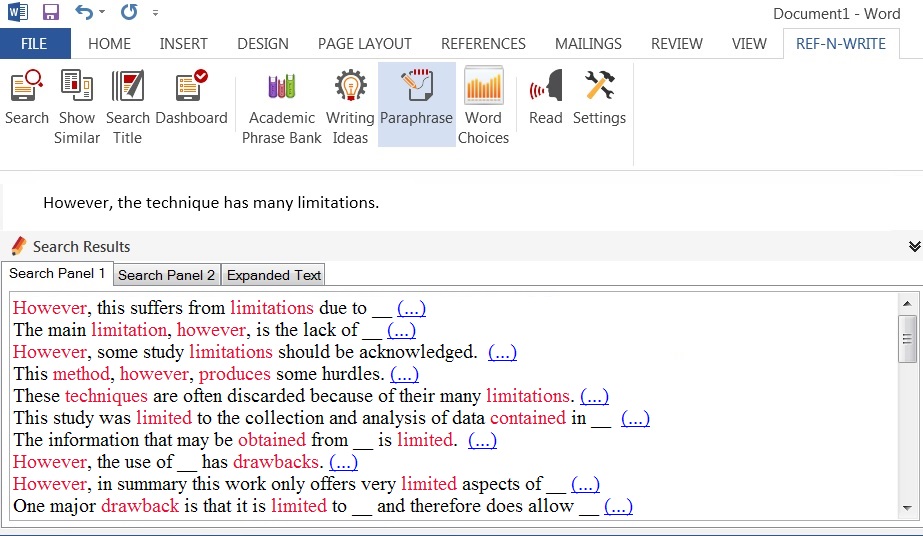
4. Ref-N-Write Phrasebank vs. Manchester Phrasebank
The Manchester academic phrasebank is the most popular resource of academic writing phrases and was put together by Dr John Morley at The University of Manchester. The academic phrase bank is available in different forms, it is accessible through their website and is also available to purchase as an e-book. One of the motivations behind REF-N-WRITE Phrasebank is to create a fully searchable library of academic phrases that students and researchers can search on-the-fly while writing their papers. The REF-N-WRITE phrase bank is available as a part of the REF-N-WRITE Word AddIn, it means that the users can search through the library and lookup for academic writing phrase ideas within Microsoft Word.
By combining both REF-N-WRITE and Manchester phrasebanks together it is possible to generate high-quality scientific articles. REF-N-WRITE offers import facility which allows users to import documents in PDF and word formats into MS Word and then search through them during the writing process. Since Manchester Phrasebank is available in PDF version, the user using REF-N-WRITE can import the Manchester Phrasebank PDF into REF-N-WRITE and access the phrases from both Manchester Phrasebank and REF-N-WRITE Phrasebank simultaneously. The figure below illustrates phrases from the Manchester phrasebank being accessed within REF-N-WRITE Word AddIn.
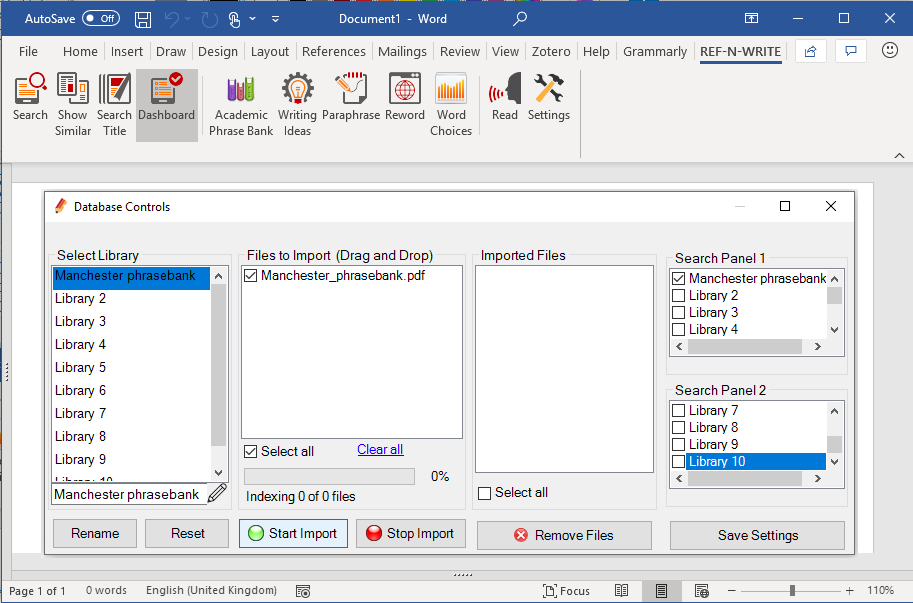
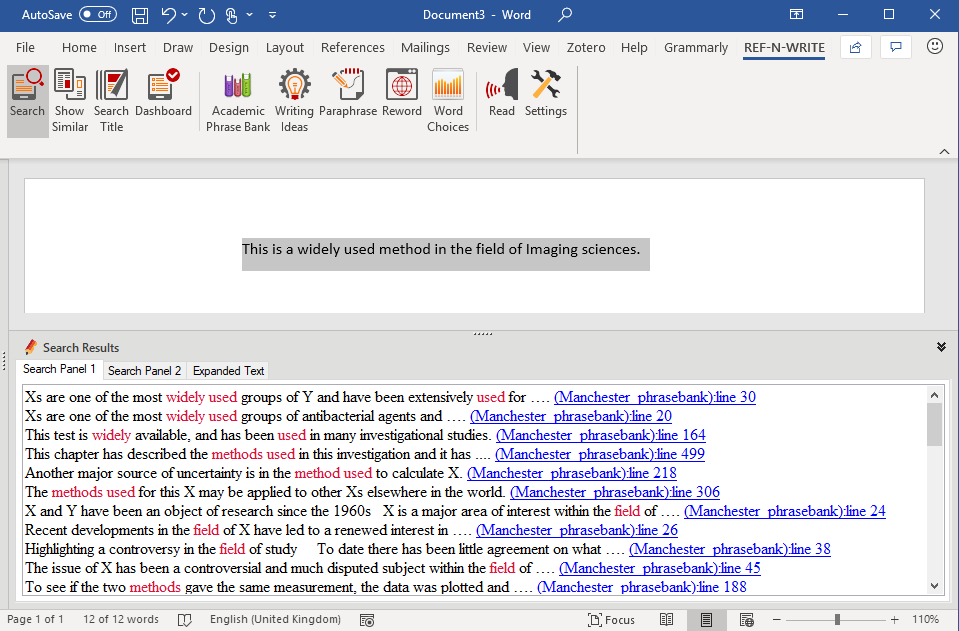
5. Importance of using Academic phrases and Scientific words in Research Papers
Academic writing is different from normal every day writing in the sense that most words and terms used in general writing will be considered colloquial if used in research papers. One of the requirements of academic writing is that it requires the use of formal language in writing. We define formal language as the use of well-accepted scientific terms and phrases widely used by your peers in your subject area. In other words, the language you use in your academic essay or paper should be broadly in line with the one used by your academic or research community.
Such a skill is not easy to acquire, it takes time. Typically, your academic supervisor will provide guidance in this regard. When you are writing a research paper, your academic supervisor will review the paper first and provide you with suggestions to improve the language. The benefit of using a good academic phrasebank is that you can start perfecting the writing right from the start as you will be able to lookup for academic phrases and scientific words as you write your first draft. This will reduce the need for multiple revisions as your first version will be in a state that is academically acceptable.
